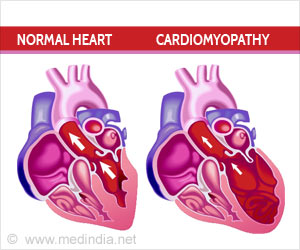Genetic testing looks for gene mutations known to cause cardiomyopathy in children. It can help guide therapeutic approaches and inform prognosis.
- Cardiomyopathy in children can be diagnosed by genetic testing
- Genetic testing can identify youngsters who might develop heart failure and need a heart transplant
What is Cardiomyopathy
The research looked at the genetic factors that contribute to baby and childhood-onset cardiomyopathy and was published in the journal Circulation: Genomic and Precision Medicine. Cardiomyopathy is a condition in which the heart’s muscles are weakened. This makes it challenging for the heart to adequately circulate blood throughout the body. Children with cardiomyopathy are more prone than adults to experience serious heart failure, life-threatening arrhythmias, and the need for a heart transplant.Dr Richard Bagnall, Head of the Bioinformatics and Molecular Genetics Laboratory at the Centenary Institute and the study’s lead author, noted that while cardiomyopathy in infants and children is uncommon, it frequently causes serious health issues and even death.
“Genetic testing allows us to look for variations (mutations) in the genes known to cause cardiomyopathy. We wanted to better understand this disease in children,” Dr Bagnall said.
221 children with cardiomyopathy who were 18 years of age or younger from Melbourne and Sydney were enrolled in the study through pediatric cardiology services or genetic heart disease clinics. Family members were genetically examined when it was feasible. A third of the individuals had cardiomyopathy when they were under a year old. A similar number had a heart transplant.
In addition to determining the genetic foundation, Dr Bagnall stated that the research team was interested in learning why certain newborns and young children develop heart failure and require a transplant while their parents and siblings do not.
“We established that cardiomyopathy in children often has an underlying and known genetic basis,” said Dr Bagnall. “When a child required a transplant, but family members didn’t, we often found that the gene mutation causing the disease was not found in their parents or that the child had two separate variants – one from each parent.”
Robert Weintraub, a professor at Murdoch Children’s, said patients and their families needed to comprehend the underlying causes of these significant and occasionally life-altering diseases.
Genetic Testing in Cardiomyopathy
“Knowing that a gene mutation is a cause of their child’s condition can provide answers to otherwise unresolved questions,” he said. “In addition to the scientific knowledge gained about which mutations cause heart muscle conditions at different ages, unaffected children from the same family who do not have the gene change, no longer require ongoing surveillance. Children who have the mutation may not develop the condition but do require close follow-up. There is still a lot to learn, however, particularly in those families where no gene mutation has been found.”According to Dr Bagnall, the results showed that the genetic diagnosis of pediatric cardiomyopathy provided significant clinical advantages, enabling a more accurate and speedier diagnosis as well as the identification of recessive and other gene variants.
“Genetic testing can often mean a more accurate diagnosis that can guide therapeutic approaches, inform prognosis and help in better identifying other family members who may also be at risk of developing the disease,” he said.
Source-Medindia
















